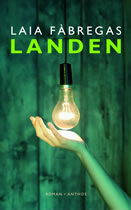Laia Fàbregas
Landing (Landen)
Ingenious composition
‘Biztresa’ means nothing, not in any language. It is just a collection of letters, but anyone who wants can find meaning in it. In Landen (Landing) by Laia Fàbregas, it is a metaphor for art, found hidden in a small chest that plays a central role. When the man to whom the chest belongs dies during a flight from Spain to The Netherlands, the woman who’d been placed in the seat beside him takes it with her.
Gradually, as the two protagonists take turns telling a chapter and the chapters jump backwards and forwards in time, the reader grows familiar with both their perspectives and finds out how much the lives of these two strangers were intertwined.
Fàbregas reveals their histories ingeniously. He, a widower, migrant and former worker at the Philips lightbulb factory, is travelling to meet his son and grandchild. She is a young woman, working for the Tax Office, much affected by the loss of her parents, who died in a car accident long ago, from which she was saved. She is still looking for the person who rescued her, albeit quite haphazardly. Yet, she manages to achieve an astonishing result, demonstrating how thought-through this tale is, how evocative it is – and how the inventive Fàbregas has dared to trust her reader’s insights. It is like being in a maze, having to find the way out yourself. But in reality Fàbregas has left discreet clues along the way, and you discover that she has been ahead of you all along. The first draft may have included more detail, but it was excised, making us think ourselves. This is what Landen shows us most of all – apart from beautiful, substantive ideas about art and identity – how the rock reveals itself in the pebble.
Publisher
Anthos
Herengracht 499
NL - 1017 BT Amsterdam
TEL. +31 20 524 54 11
FAX +31 20 420 04 22
E-mail: [email protected]
Website: www.amboanthos.nl
Publishing details
Landen (2010, 209 pp)

Biography
Born in Barcelona in 1973, Laia Fàbregas has lived in The Netherlands and in Spain and studied in both countries – Visual Arts at the University of Barcelona and, later, Art and Culture Management in Rotterdam. She also followed the creative writing course at the Rietveld Academy in Amsterdam. Having originally gone there to enrich her art, her first novel, Het meisje met de negen vingers (The Girl with the Nine Fingers), about two Catalan sisters growing up in the latter days of the Franco regime was published at this time. It was well received and has been translated into several other languages. One line from her debut illustrates the kind of author Fàbregas is: ‘You’re really conceptual, you.’ It’s an offhand declaration of love from one character to another, yet it characterises what Fàbregas is doing, creating literature that playfully speaks of art. Landen is her second novel.
Dossier
Quotes
That bizarre ending confronts you with the impression you already had while reading: that the two stories in the book are connected, that together they will lead to a solution. When they don’t, the whole book takes on something intangible and fascinating – and you understand why Fàbregas is a devotee of Paul Auster and of conceptual art.
NRC Handelsblad
A beautiful combination of philosophical depth and a gripping story.
Boek
Translations
- La Llista. Barcelona: Ara Llibres, 2010
- Continued...
Rights sold
- Actes Sud (Arles, Frankrijk)
- Alfaguara (Madrid, Spanje)
- Kavis (Istanbul, Turkey)
- Continued...
